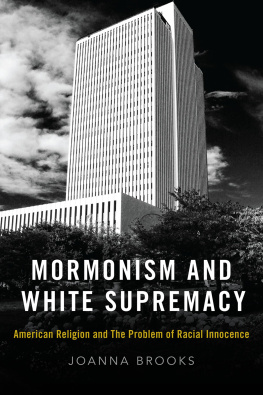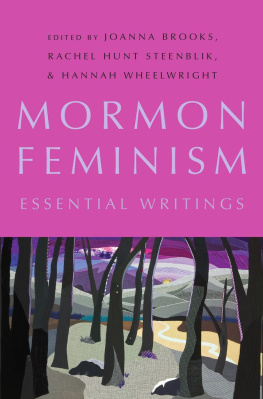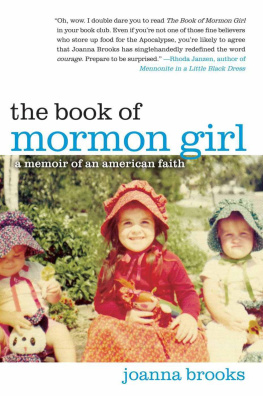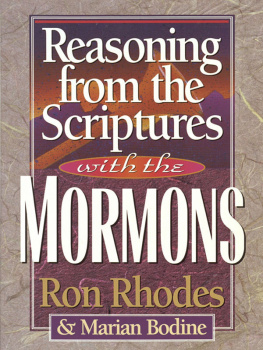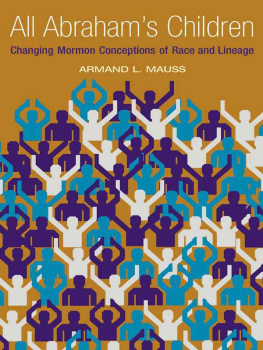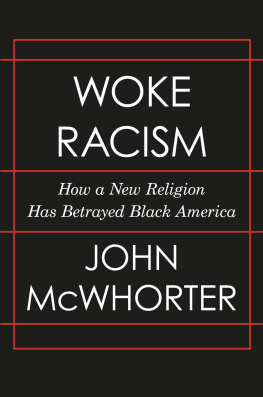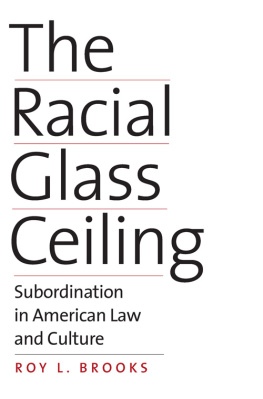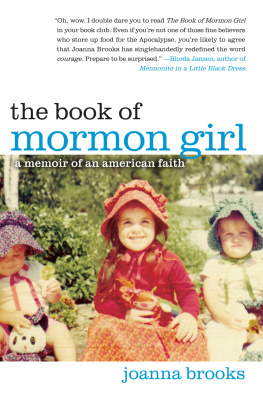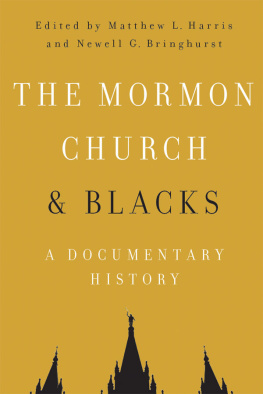MORMONISM AND WHITE SUPREMACY

Oxford University Press is a department of the University of Oxford. It furthers the Universitys objective of excellence in research, scholarship, and education by publishing worldwide. Oxford is a registered trade mark of Oxford University Press in the UK and certain other countries.
Published in the United States of America by Oxford University Press
198 Madison Avenue, New York, NY 10016, United States of America.
Oxford University Press 2020
All rights reserved. No part of this publication may be reproduced, stored in a retrieval system, or transmitted, in any form or by any means, without the prior permission in writing of Oxford University Press, or as expressly permitted by law, by license, or under terms agreed with the appropriate reproduction rights organization. Inquiries concerning reproduction outside the scope of the above should be sent to the Rights Department, Oxford University Press, at the address above.
You must not circulate this work in any other form and you must impose this same condition on any acquirer.
CIP data is on file at the Library of Congress
ISBN 9780190081768
eISBN 9780190081775
In memory of my teacher Eugene England,
who opened freshman orientation at Brigham Young University
by writing out 2 Nephi 26: 33 on the chalkboard.
Contents
and emotional work every day to safeguard their wholeness and the wholeness of their children. And it is the fact that these and so many other systematic inequities persist while white people sit in church and call it good. It is easy to see torches at Charlottesville and resort to our Sunday meetings to pray; it is not easy to look at our Sunday meetings and see how over time they have conditioned us to accept Black death and suffering by other peoples of color.
As a person of faith and as a scholar of religion, race, gender, and culture in America, I see a role for scholarship and teaching in unsettling and interjecting urgency into conversations around religion and race in America. When I look back, I can see that historical scholarship has focused on the clearest examples of good and evil: on the ways religion has been mobilized in the service of anti-racist activism, especially by Black churches, or, conversely, in the service of explicit forms of white racism, especially among white evangelicals in the American South. My goal is to move the conversation yet another step by exploring how the predominantly white venues and denominations through which we have pursued the sacred and hope to pursue mercy and justice have themselves contributedif unknowinglyto white supremacy.
We can start with the way American Christianity teaches its white practitioners about what it means to be good or moral and how it rewards that goodness. Christianity takes as its central theological concern sin and redemption. Consequently, how American churches teach their adherents about sinthrough instruction and through ritualexerts tremendous influence on our individual and collective capacities for moral reasoning and problem solving. As the legacy majority religion in the United States, American Christianity has effectively furnished our national language for judging value, worthiness, guilt, and innocence and for establishing moral priorities to guide the allocation of resources and the application of power. It has instilled in white American imaginations notions of the good, the holy, and the evil that are permeated with racial privilege and fear. Predominantly white American churches have also fostered identity-based social networks among whites that have generated opportunity and advantage for white people. For these reasons, racial segregation of American Christianity must be understood not only as a testament to the powerful role of Black churches in creating domains for the experience of sovereignty, freer self-expression, and collective and individual care but also as a reflection of the role church spaces have played for whites to comfortably experience the same, often in the service of white privilegewhich is to say, white supremacy.
I am particularly interested in white American Christianity as a technology for the production of what scholars describe as racial innocence. The option to believe that one is innocentmorally exemptof systematic and pervasive anti-Black racism is a privilege cultivated among, by, and for the benefit of American whites. James Baldwin observed the willed innocence of white America in his 1962 letter to his nephew My Dungeon Shook, published first in Progressive magazine and then in 1963 in The Fire Next Time:
They have destroyed and are destroying hundreds of thousands of lives and do not know it and do not want to know it. One can beindeed, one must strive to becometough and philosophical concerning destruction and death, for this is what most of mankind has been best at since we have heard of war; remember, I said most of mankind, but it is not permissible that the authors of devastation should also be innocent. It is the innocence which constitutes the crime.... There is no reason for you to try to become like white men and there is no basis whatever for their impertinent assumption that they must accept you. The really terrible thing, old buddy, is that you must accept them, and I mean that very seriously. You must accept them and accept them with love, for these innocent people have no other hope. They are in effect still trapped in a history which they do not understand and until they understand it, they cannot be released from it.
White American Christianity has done a great deal to reassure white people and maintain us in our misunderstanding. It has sown into our imaginations a deep association of whitenessas color, as symbol, as identitywith innocence and blackness with guilt. It has engaged Americans in performances and rituals designed to convey a sense of absolution or transcendence without moral responsibility. White American Christianity has also advanced one of the constituting mechanisms of whiteness by creating spaces that do not require white people to name their whiteness and acknowledge their privilege. According to American studies scholars like George Lipsitz and Anne DuCille, whiteness derives power from the fact that it does not name or acknowledge itself but rather assumes an unnamed role as an organizing principle of social relations and a driver of value.
Moreover, Christian concepts of innocence, sin, and retribution or redemption have been essential to legal reasoning around racial issues in the United States. There was a time early in the Christian movement when sin was broadly understood as a collective condition to be redeemed as gathered-in communities transacted with God and each other through the medium of Jesus Christ. Over time, and especially with the coming of Enlightenment rationalism, prevailing concepts of sin in American Christianity shifted dramatically so that it became somewhat normal to think of sin as an individual act to be expiated through transaction with the church. This greatly diminished understanding of sin was useful to a white American nationalism predicated on the belief that God had put white people on this land in a state of innocence to fulfill a divinely appointed mission. It allowed mainstream white American Christians to simplify morality, to associate it with the unknowing blamelessness of children rather than the hard-won wisdom of adults who make difficult choices.

